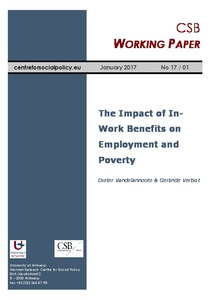The impact of in-work benefits on employment and poverty
"This article studies the impact of design characteristics of in-work benefits on employment and poverty in an international comparative setting, taking account of both first and second order effects. We use the microsimulation model EUROMOD, which has been enriched with a discrete labour suppl...
| Main Authors: | , , |
|---|---|
| Institution: | ETUI-European Trade Union Institute |
| Format: | TEXT |
| Language: | English |
| Published: |
Antwerp
2017
CSB |
| Subjects: | |
| Online Access: | https://www.labourline.org/KENTIKA-616612443489-The-impact-of-in-work-benefits.htm |
| Summary: | "This article studies the impact of design characteristics of in-work benefits on employment and poverty in an international comparative setting, taking account of both first and second order effects. We use the microsimulation model EUROMOD, which has been enriched with a discrete labour supply model in order to take account of labour supply reactions. The analysis is performed for four EU-member states: Belgium, Italy, Poland and Sweden. The results show that design characteristics matter substantially, though the specific effects differ in magnitude across countries, indicating there is no one-size-fits-all solution. Throughout the analysis, numerous trade-offs are uncovered: not only between employment and poverty goals, but also within employment incentives itself (extensive vs. intensive margin). Taking account of behavioral reactions attenuates the impact on poverty outcomes, signaling the importance of bringing these effects into the empirical analysis." |
|---|---|
| Physical Description: | 31 p. Digital |

